#trans is a vicious religion
Text
The thing that really made me create an alt account to share my thoughts was this business with KC Miller on Twitter. I honestly couldn’t believe it. They blamed this mentally ill child for her choices instead of admitting that gravely altering a child beyond recognition may not be the panacea for all that ails their body issues. And the “medical professionals” that did this to her should not have done anything drastic to her body based on the simple fact that she had multiple mental comorbidities.
Somebody fucked up and it wasn’t the mentally ill 16-year old, but because she’s gone against the Holy Gender Doctrine they feel empowered dogpile on her. “Lol it’s not our fault that you’re ugly.”
Like these are the same fragile souls that threaten to off themselves whenever they get misgendered but have no human empathy for a kid who was done wrong by every adult she encountered.
So many of these TIMs are so used to the “Slaaay Queeen!” and “yOu lOoK sOooooOOOO gOOOOd!” that every trans advocate is forced to recite in their presence that they don’t realize if frank, honest conversations about how trans people look became the norm it would SHATTER them.
There are plenty of gorgeous TIFs because women are gorgeous, but TIMs are few and far between. And of course TIMs are the ones leading the charge on dunking on this poor child (though every trans advocate gay/straight/man/woman were being awful).
#kc miller#terfs please interact#trans is a vicious religion#TIMs ruining things#gender critical#detrans
26 notes
·
View notes
Text
There is a Rampant and Vicious Cycle in the Online Left That Needs to Be Addressed
Every leftist needs to understand that not every proclaimed leftist is a safe person or one that is acting in good faith. Many people in this sphere --even if they are minorities themselves-- are Abusers. Let me be clear: they are Abusers REGARDLESS of --NOT because of-- them being a minority. Despite this, many of them have weaponized their standing as a minority in order to get away with their behavior and achieve what they see as some form of power and control over others.
Let me be clear. I am referring to those that:
Manipulate and lie about pressing situations (especially when it's to harm another person or demographic)
Excessively use idpol to either elevate themselves to holier than thou levels ("listen to ___ people but only when it's something I agree with, which just so happens to devolve from constructive change to making others grovel and plead forgiveness endlessly before me") or belittle others (ie their skin color, gender, queerness, disability, neurodivergence, religion, age, etc.) in order to discount their point or not treat them as equal human beings; yes, even if their skin tone is white or if they are men, abuse does not have to be backed up by systemic issues in order to be abusive or at the very least harmful (sidenote: this does not apply to people talking about their experiences as a minority that is otherwise not experienced or understood by others, the issue I'm pointing out is when it's twisted to cover everything not directly tied to their identity and proclaim themselves as the only ones allowed to be the voice of reason, therefore shutting up everyone else and to avoid any constructive criticism or discussion)
Act on rage and at times even trauma to bring forth harmful ideals (ex: truly hating every person of a demographic, wishing for a genocide, making actual death or rape threats towards someone or a group, conversion, etc)(sidenote: I'm not discounting those that have trauma and even have harmful thoughts, just please seek help and understand that it is not healthy nor sustainable to paint or alter reality to be in line with what trauma makes you believe)
Actively try to get others they don't agree with to either permanently leave the internet or commit suicide and even celebrate when either happens
Excessively test others on their "purity" on unachievable standards to the detriment of everyone and Leftism as a whole (purity culture is fueled by christian culture in order to disguise doomerism, accepting defeat when change is not possible, of which is the very thing that will kill leftism)
Infight over weird made up issues (remember how divide and conquer is a war strategy? To split hairs and discount others for non-issues is to do the work of conservatives and nazis for them)
Shut down people or discussions over minor slights such as using an incorrect word/phrasing or any numerous perceived mistakes (example I've seen here: berating a person with schizophrenia (or a trans person or any other minority) for using a derogatory term for themselves when they're talking about how everyone else is speaking over them and not listening), ignoring the hypocrisy or not taking into account any number of mundane causes such as non-native english speakers, generational gaps, being in the process of learning (either recovering from harmful beliefs or simple ignorance), using those terms to prove a point (such as that example I mentioned above), neurodivergence, etc.
Not letting others talk about their experiences of oppression when those experiences don't match theirs, instead opting to call those people bigoted for contrived reasons
A rejection of nuance, intersectionalism, and even reality to better suit their goals (ex: claiming that every trans man benefits from the patriarchy and can never experience misogyny)
Misuse of therapy speak and terminology in order to water down those terms and render them near meaningless so they can weaponize them under the pretense of their original use (ex: gaslighting), or to cut off any need to connect or sympathize with other human beings and instead speak to them like a PR message (refer to this video by Zena and Poppy for reference)
They never speak on true leftist/progressive ideals or positive change, they only engage in destructive discourse or any behavior listed above
Making baseless dangerous accusations towards someone they don't like. Before you go harr harr you're doing that, I'm not calling out any specific person and am merely listing dangerous behaviors I've seen people here act out. What I am referring to are when someone casually calls someone specific a predator (or whatever else) with absolutely zero proof and expecting everyone to believe them no questions asked. This has been shown to ruin people's lives
Any other similar behaviors not included in this list (as well as classic logical fallacies), but what I've mentioned above should paint you a good picture
Every example I've pointed out were REAL EVENTS I've seen from people that proclaim themselves as leftists or even just progressive, and sometimes are even minorities themselves (some even infight against their own communities using the behaviors listed above, often out of internalized bigotry)(an example of a real event that happened here recently were when several people were making rape threats towards a trans man by the username of @a-faggot-with-opinions). To be blunt, I'm pointing out exclusionism in practically every form, asexual discourse, transandrophobia, TERFs/radfems, TEHMs, tankies, "cornbreadtube", nationalists and ethnonationalists, and all else I don't have the terminology for
For many of the people that fall under that bullet list I would hesitate to even refer to them as leftist or progressive, as they never seem to actually show they act on it or even believe in it, only making an appearance in those communities for their own destructive personal gain; hell, often times they have ideals that directly go against what those communities stand for! Examples include TERFs with white supremacist beliefs, transandrophobes that are misogynistic, ethnonationalists that are antisemitic, puritans that are ableist, the list goes on forever. Once you know what to look for, you can see the hidden or overt bigotry behind their false "progressive" statements
No one is infallible
No one is better than everyone else
You are not immune to propaganda
No one is immune from behaving abusively
These people are dangerous, whether they actually qualify as abusers --as I've been referring to them as such for brevity and impact-- or are people that are engaging in hurtful or fully abusive behavior (use this paragraph as a disclaimer, I of course can't know if someone is an abuser in real life unless there is documented evidence of such). Regardless, they are hurting the left and are letting the right win
If you see any of these behaviors either 1) take caution if you're unsure, 2) block them, or 3) if you have the fortitude, call them out. Either way, use your best judgement and think for yourself (or discuss with good faith leftists if you're uncertain). And remember, often times (albeit not always) they are actually fully aware of their disgusting behavior and are choosing to act maliciously, not ignorantly.
Stay safe, log off, do what you can to support your local community and leftism as a whole, don't let these people distract from the real issues at hand.
Have empathy, if you don't have empathy then act in compassion, if you don't or refuse to do either please do not engage in politics. Misanthropy has no place in matters concerning humanity.
And remember: we have to stand together in unity so we can create a better future for all
#politics#leftism#online left#discourse#tw abuse#tw rape mention#tw genocide mention#tw bigotry#racism#transphobia#transandrophobia#purity culture#vent#this goes for several issues I haven't mentioned whether due to a lack of proper wordage or expertise due to not being part of those groups#I'm a non-native english speaker who is autistic be aware of that if I do misphrase something#Poppy and Zena: Wholesome Degenerates is an excellent youtube channel please check them out#if anyone argues here in bad faith feel free to use this post as a free block list#had so much to say but now I can get back to shitposting les go
279 notes
·
View notes
Note
Modern Blizzard: Look two white characters in Warcraft are gay, aren't we woke and progressive? Now see them massacre some teepee dwelling monsters that worship the evil religion of voodoo and won't give up their land to the poor white europeans!
Modern Blizzard: Now don't you turn your brightness up or those ice giants that are expressing their "Giantess" gender identity while eating babies might look like they're trans pride flag colors because of the pink aura we gave them!

Modern Blizzard: And don't worry, we're REALLY good at writing characters that fit our own established universe. You know Centaurs, yeah? Proud. Strong. Warrior people. Hunters. Vicious and cunning. They'll put you through unbelievably life-threatening tests to prove your power and your worth to them! That's the foundation we use when writing centaur characters. Unless they're gay, we don't want gay characters who are strong and proud, we want our gay characters to giggle like flamboyant little pansies and say unrealistic one-dimensional shit like repeatedly saying they love each other because we learned how gay people act through Discord dom/sub relationships in furry RP servers, just check out this dialogue between the two gay centaurs:

Modern Blizzard: Because we here at Modern Blizzard want you to really FEEL like you're playing a Facebook corporate account with a rainbow pride flag over its avatar for pride month! Please be blinded by all this lazy pandering and forget about that sexual harassment lawsuit please PLEASE WE DIDN'T STEAL THAT MUCH BREAST MILK AND WE FIRED KOTICK FOR LIKE 3 DAYS BEFORE REHIRING HIM
Modern Blizzard: MCREE'S NAME IS COLE CASSIDY NOW WE'VE CHANGED
9 notes
·
View notes
Note
Hello. I have no one to talk to about this irl and I saw that you are also Palestinian and Muslim so I thought I’d take my shot and ask. I’m Muslim and I love my religion with all my heart. I hate to say this, but sometimes I feel like I’m held back, or that I have to choose between two worlds. I want to experience the ‘bad’ things in life. The things I’ve been told I’ll burn in hell for. Mainly relationships and …figuring out my sexuality. But I feel like god will abandoned me. I feel like I can’t just go pray and do or think these things. But if I don’t experience these things or accept myself then I’ll never be able to grow as a person.
Salam Anon! I am sorry you have nobody you can speak to about this IRL. First of all, I love you and you're not doing anything 'bad' and everything will be okay.
I apologize in advance if this is a long-winded reply, and I focused a lot on being Queer and Muslim, though I think there are a lot of things conservative Muslims unfairly demonize which this can apply to. And forgive me if I start to sound preachy later on ~
I think living in an environment where it's drilled into you that an inherent part of yourself is evil and wrong is something I wouldn't wish upon anyone -- and it's something I think even non-Muslim queer / gay / trans people experience as well.
Still when it comes to Islam, I know how it is to feel that resources are not there and if they are they're hard to find or inaccessible.
(below the cut 'cause it got long)
I don't know what environment you have grown up in, friend, whether you grew up in a predominantly Muslim country or you grew up in a Western country. But I can relate either way to growing up afraid of thinking about these things, and I hope some part of my experience helps you!
I spent my formative teenage years in Jordan, a predominantly Muslim country, and my parents were, and still are, incredibly conservative Sunni Muslims and while, looking back, I was clearly a young lesbian, I didn't really allow myself to think on my attraction to women because, the way I was raised, even picturing myself in that situation filled me with revulsion and disgust. It made me viscerally uncomfortable. But being with men also made me feel disgusted (because I was not attracted to them LMAO).
But like you, I also love my faith and don't want to leave it. I will say, after years trying to find a place in Islam where I feel comfortable, my advice is to remember the following:
Allah (SWT) is the most merciful. That is one of the things that is repeated the most in the Qur'an. Allah (SWT) loves His creations more deeply than any love in existence --whether they are doing "bad" things or not and His forgiveness is only conditional on whether your repent for your actions is pure.
While it sounds nice to try and find Hadith and stories about the Sahaba that "prove" that being queer is okay after all and you've owned the homophobes with logic and facts, that is actually a trap. There will always be differing interpretations of Hadith and Sunna and it will be a vicious cycle of "What if I was wrong about my sexuality" and "No I was actually right all along" and it's exhausting. You have to lead yourself to a point where it doesn't matter if you find justification for who you are. (Certainly straight Muslims never have to do that)
It was narrated by Omar Ibn Al-Khattab that Muhammad (PBUH) said: إنما الأعمال بالنيّات ، وإنما لكل امريء مانوى ، فمن كانت هجرته إلى الله ورسوله ، فهجرته إلى الله ورسوله ، ومن كانت هجرته لدنيا يصيبها ، أو امرأة ينكحها ، فهجرته إلى ما هاجر إليه (Translation: Verily actions are by intentions, and for every person is what he intended. So the one whose hijrah was to Allah and His Messenger, then his hijrah was to Allah and His Messenger. And the one whose hijrah was for the world to gain from it, or a woman to marry her, then his hijrah was to what he made hijrah for.) And this is also something that brings me guidance when I feel unsure if I'm doing the right thing -- whether that's with my faith or in life. Your intent matters and it always does -- at least in the eyes of Allah (SWT). And if your intent is to understand yourself and the world around you without hurting anyone, then that is between you and Allah (SWT)
Nobody can tell you that you're going to hell except Allah (SWT). Not even Muhammad (PBUH) can tell you if you're going to hell. You do not know if you're going to hell. In Islam, it is easier to go to heaven than to go to hell and don't let anyone convince you otherwise.
Culture affects your perception of how 'bad' something is. There are far worse sins that Muslims commit on a daily basis without having a crisis of faith. That's the arrogance of conservative Muslims. They will play Qur'an 24/7 on in their house and with those same hands beat their children and gossip and judge others unfairly.
Take it easy on yourself. Breathe. Everything will be okay and you are not a bad person or a bad Muslim for wanting to better understand yourself.
I know what works for me is not "one size fits all" so take with a grain of salt. But basically, what I gently advise is to explore. Do what you need to do to strengthen your faith.
I can't tell you what you'll discover as you do this. Maybe you explore your sexuality and have relationships and you find out you're not gay? That's okay. And if you find out you are actually gay/trans/bi/pan/lesbian/queer...etc? That's fine. You can still be Muslim. Allah (SWT) still loves you. You're not doing a bad thing. Even if you're acting on those feelings.
I'm sorry this got so long, but please if you ever need to reach out, you are also welcome to DM me off anon anytime you want <3
46 notes
·
View notes
Text
i am so fucking sad tonight and i used to put that stuff on here like a decade ago so here we are again ig. just.
really horrid combination of things happening right now and it makes me extra upset bc i'm into my second month on low-dose t and the first month was going so fucking well for like. being conducive to the last of my trauma recovery? and then, of course, recovery isn't linear and also my parents seem intent to retraumatise me whenever they can. but like.
english terf hits our shores
completely inescapable discourse, and also targeted abuse, on twitter and elsewhere. also i wrote an op-ed bc our media are useless and we need at least a few trans voices out there (hopefully it does get picked up, but it was gruelling to write)
my mother switches from spreading conspiracy theories about climate change to a sudden and vicious focus on trans people. not that she ever stopped being a bigot but usually it's one post every few months about how conversion therapy works and not several posts a day from people who want trans people murdered
scheduled to be interviewed for a study on conversion therapy survivors on tuesday
scheduled to go on holiday with my family on thursday. i booked a separate room so i won't have to attempt to take my (oral, twice daily with food, specifically bc the endo didn't want me on injections until we knew for sure i wouldn't need to suddenly stop t to avoid extended ptsd episodes) testosterone around family who would be very willing to attempt conversion therapy round fucking four on me
i have no idea if my job will still be there for me when i get back from this scheduled leave bc [gestures at tech companies and ai]
conference all day monday (tomorrow, technically) that i know will eat all my spoons, and that doesn't cater for my dietary needs so i'll have to pack food
and it's like. i am so sad. i am so so sad. i have been making a concerted effort w my family because my paatti (dad's mother) is in town, the one i've talked about before who doesn't know i'm gay and married bc my parents have prevented that happening. and i feel so lonely and so cut off bc as a diaspora/migrant family, and a mixed one at that, my only connection to my cultures is via my parents who fucking hate who i am. so i've been trying to hang out with her when they're not around. i said yes to this vacation, we'll get more time together and some pictures and stuff.
but i'm still fielding her questions about why i don't have a boyfriend. and my parents have decided to, right when i'm most stressed about being trans, and about connection to family, be the worst people they can be about it again i guess? and it's true that my conversion therapy/parental/religion trauma is the stuff i've never come back around to working on in therapy bc my parents are actively reopening the wound every few months and it's. hard to work with that.
fucking like. shocking that i recovered from ptsd once, after [black box of getting csaed more times than i can count], immediately got groomed in a way that's rly fucking complicated to talk about bc my ex is a trans woman who decided to come out as a child-grooming rapist and as trans in the same month, and terfs salivate over the idea of using people like her as a cudgel, and completely forgot that approximately 300 other things, sa and otherwise, happened to me along the way to the point where my psych said she was surprised/proud i haven't killed anyone yet.
so i'm sad about all of them at once rn except the brain injury means i can only hold about two in my active memory at a time and i keep alternating which ones i'm sad about like shuffling several decks of cards really fast i guess.
#tony muses#this is a big long vent post and mentions csa#but it's not a 'don't read will delete later' you are welcome to read it#also cw terf shit and conversion therapy and parental stuff and religious trauma and idk what needs to be tagged. cultural alienation?#i am literally just sad#and transphobes are unavoidable on twt rn
8 notes
·
View notes
Note
do.... the multiples of 3
3. Which pronouns do you use?
she/they^^
6. (If you’re out) do you wish you came out sooner? Later? Or was it the right time?
I mean, I kind of wish I had known as a kid because with my incredible luck at the parent lottery I would've probably gotten to transition before puberty, but well, it turned out mostly fine in the end
9. When did you realize you weren’t cishet?
After many months of vicious denial interspersed by reading up on trans things on various subreddits and a lot of yuri manga at some point in November 2018 I was reading a chapter of Citrus and then I had a full on breakdown over it in the bath and I've been a lesbian ever since^^
12. Name some queer artists/bands or songs you like most:
I generally have little to no idea about who the people who make the music I like are. I listened to girl in red a bunch at some point I guess?
15. How has your identity changed over time?
not much at all. I was considering some nonbinary aspects at some point and I am literally all the time wondering how demisexual I am and how far it would make sense to consider myself on the ace spectrum but there's never really any concrete changes just some vague questioning that doesn't really go anywhere
18. How old were you when you got to attend your first Pride? Who did you go with?
pride is for people who do not die outside on a sunny day in June, who's eardrums can take a crowd for longer than 5 minutes and who aren't murdered by anxiety when expected to interact with other people; none of which applies to me
21. What message would you give to your younger self?
"You. Girl. Explains. Everything."
24. Do you practice any religion, if so how does it play into your LGBT identity? Do you feel welcomed by your spiritual community?
No, unless reading up a bit on Buddhism once every couple years counts.
27. What gender-neutral terms for yourself or others do you use (i.e. joyfriend)?
pretty sure I don't use any of these except for the ones that are standard.
30. Are you monogamous or polyamorous?
I'd consider polyamory if somehow it landed in my lap and was like one of these equilateral triangle relationships, but it'd be a pain to seek out and I'm not sure how I'd realistically handle it. And given that i do long distance with my girlfriend rn it just sounds like a huge bag of unnecessary trouble, we barely manage to make two schedules work together.
33. What about your LGBT identity do you feel proud of/ want to recognize/celebrate?
lesbians be proud of not being attracted to men^^
trans girls be as cute as you like and appropriate anime to do so^^
3 notes
·
View notes
Text
She was being accused, she says, of having ‘desecrated the prevailing orthodoxy’. ‘It was like being accused of blasphemy in a religion that is not yours.’
The unconscionable barbarism of cancel culture
spiked-online.com November 30, 2022
View Original
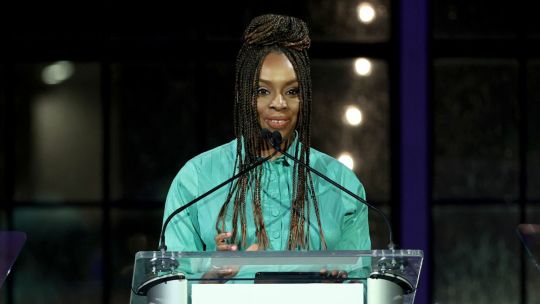
There are so many good things in Nigerian novelist Chimamanda Ngozi Adichie’s Reith lecture on freedom of speech. She shatters the case for cancel culture. She lays waste to the patrician left’s claim that free speech serves the powerful but harms the powerless. She issues a stirring call for a new solidarity of liberty-lovers against the ‘unconscionable barbarism’ of punishing people for what they think and say. But the best thing, the thing that makes the breath catch in your throat as you listen, is just how unrepentant her love of freedom is. This is no meek, apologetic plea for a few more rights to say what we think. No, she’s passionate about this liberty, and it is rare indeed to hear that today. It is a truly infectious and inspiring call to arms.
This year’s BBC Reith lectures are titled ‘The Four Freedoms’. The first, Adichie’s, is on the freedom to speak. Her diagnosis of the crisis of free expression is peerless. She says the problem we face in the West right now is not the jackboot of government tyranny pressed on the throat of free debate. It’s social conformism. It’s the overbearing pressure to adhere to ‘the collectively sanctioned attitudes and behaviours of this era’. ‘The biggest threat to speech today is not legal or political, but social’, she says. She recognises this is ‘not a new idea’: ‘When John Stuart Mill warned against “the tyranny of prevailing opinion and feeling”, it reads as though he foresaw the threat that orthodoxy poses today.’ But the ‘present manifestation’ of this ‘social censure’ is, she says, especially severe. It desires nothing less than the permanent banishment from society – that is, the cancellation – of anyone caught deviating from sanctioned thought.
Adichie describes brilliantly the horrors of cancel culture. Against those who apologise for this new species of social tyranny, who say it’s just about holding people to account for what they say, Adichie brings a stirring clarity. ‘There is a difference between valid criticism, which should be part of free expression, and this kind of backlash – ugly personal insults, putting addresses of homes and children’s schools online, trying to make people lose their jobs. To anyone who thinks, “Well, some people who have said terrible things deserve it”, no – nobody deserves it. It is unconscionable barbarism. It is a virtual vigilante action whose aim is not just to silence the person who has spoken, but to create a vengeful atmosphere that deters others from speaking.’
This is one of the finest elucidations on cancel culture I have heard. Adichie recognises what so many others fail to: that cancel culture’s grimmest achievement is not to claim the scalps of a handful of controversial individuals, but rather to send a message to everyone else that they had better shut their mouths if they don’t want to suffer the same fate. The result? An ‘epidemic of self-censorship’, she says. She fears the grip social censure has on the young in particular: ‘Many young people are growing up in this cauldron, afraid to ask questions for fear of asking the wrong questions.’ ‘And so’, she says, ‘they practise an exquisite kind of self-censorship. Even if they believe something to be true or important, they do not say so, because they should not say so.’
Adichie herself has encountered this ‘fierce’ expectation of conformity to sanctioned thought, this ‘vicious retaliation’ that follows every murmur of dissent. She describes being accosted by an American student at a book reading who asked her, ‘angrily’, why she had said something in an interview. Adichie doesn’t say what this something was, but we can guess: she has infuriated the social-censure set by refusing to genuflect to the mantra ‘trans women are women’ and instead uttering the blasphemy: ‘trans women are trans women’. Adichie tells her accoster that she said the thing because it ‘was the truth’. Her accoster agrees it was true but asks: ‘Why should we say it even if it’s true?’ Adichie was astonished. To her, the idea of not giving voice even to truth, lest it cause offence, is utterly alien. She was being accused, she says, of having ‘desecrated the prevailing orthodoxy’. ‘It was like being accused of blasphemy in a religion that is not yours.’
Who hasn’t felt exactly like that at some point over the past decade? Like a blasphemer against a new religiosity one doesn’t even subscribe to? It is cancel culture’s refusal to admit to its authoritarianism that most irritates Adichie. ‘There is something honest about an authoritarianism that recognises itself to be what it is. Such a system is easier to challenge because the battle lines are clear’, she says. ‘But this new social censure demands consensus while being wilfully blind to its own tyranny.’ We see this wilful blindness of the cancellers every day. We’re just calling you out, they say. We’re just protecting minority groups from offence, they cry. The denialism of the censors is extraordinary. Adichie doesn’t mince her words as to what impact this denied tyranny is having – ‘I think it portends the death of curiosity, the death of learning, and the death of creativity’.
Creativity is, of course, central to Adichie’s life as a novelist. And creativity demands full, unwavering freedom, she says. It cannot live without it. ‘To create, one needs a kind of formless roving of the mind to go nowhere and anywhere and everywhere’, she says. ‘It is from that swell that art emerges.’ This is why she is so worried about the targeting even of literature by today’s tyranny-in-denial. ‘Literature is in peril because of social censure’, she says. She cites the phenomenon of the ‘sensitivity reader’, the person whose job it is to ‘cleanse unpublished manuscripts of potentially offensive words’, employed by publishers that are ‘wary of committing secular blasphemy’. Such pre-emptive, censorious sensitivity ‘negates the very idea of literature’, she says. Expelling darkness or coarseness or offence from literature expels the humanity from it, too. If things don’t change, and soon, Adichie worries that future generations will read the books being published now and wonder: ‘How did they manage to stop being human? How were they so lacking in contradiction and complexity? How did they banish all their shadows?’
The most moving part of the lecture is when she speaks of the attack on Salman Rushdie in New York in August. It is the only moment her voice seems to quiver. She says: ‘Imagine the brutal, barbaric intimacy of a stranger standing inches from you and forcefully plunging a knife into your face and your neck multiple times because you wrote a book.’ It is superbly and necessarily confronting. She says she re-read Rushdie’s novels after the attack, in an act of ‘defiant support’, and found herself wondering how The Satanic Verses would fare today with all our sensitivity reading and cancellation. ‘Would Rushdie’s novel be published today?’, she wonders. ‘Probably not. Would it even be written? Possibly not.’ This is the harsh truth of our times: we no longer need a death warrant from an Iranian tyrant to silence ‘difficult’ writers; we do it ourselves.
Adichie’s belief in free expression extends even to defending the right of people to say untrue and malicious things. She says she wouldn’t even agree to the censorship of such foul ideas as Holocaust denial or hatred for homosexuals. ‘[The] solution is not to hide the lie’, she says, ‘but to expose it and scrub from it its false glow’. When we censor the ‘purveyors of bad ideas, we risk making them martyrs’, she says, ‘and the battle with a martyr can never be won’. As to the fashionable notion that free speech is of more benefit to powerful people than marginalised people, Adichie says ‘free speech is indeed a tool of the powerful, but it is also, crucially, the language of the powerless’. She cites the current Iranian revolt, the Arab Spring and other uprisings – ‘all wielded speech’. Then her killer line, one I hope will ring in the ears of all of those so saturated in media-studies thinking that they have lost sight of the tight bond that has always existed between free speech and the fight for equality: ‘Dissent is impossible without the freedom of speech.’
It can be difficult to challenge the epidemic of self-censorship. Precisely because today’s virtual vigilantes are so wilfully blind to their oppressive impact on society, it is hard to know how to confront them, push them back, defend freedom from their cold clutch. Adichie has an idea. It’s a brilliantly simple one. ‘The solution to this threat’, she says, ‘can only be collective action’. Social censure creates a ‘climate of fear’, she says, and it is ‘only human to fear a mob’. ‘But I would fear less’, she says, ‘if I knew my neighbour would not stay silent were I to be pilloried’. ‘We fear the mob, but the mob is us.’
That’s it: we break social censure with social solidarity, one founded in a love for freedom. ‘Moral courage’ is what we need right now, says Adichie – the moral courage to say what we believe and to refuse to participate in the punishment of those who deviate from sanctioned thought. This is the only way we can ‘make much wider the boundaries of what can be said’. My own moral courage has already been strengthened thanks to Adichie’s lecture. Everyone should listen to this clear and beautiful case for the right of every person to think and speak completely freely.
1 note
·
View note
Text
If trans identified men were truly at a higher risk for violence and murder they wouldn't keep getting away with horrific shit like this and that disgusting dude who wears his hard nipped fetish suit to his teaching job in Oakville.
#lgbtq#trans is a vicious religion#i hope somebody beats his ass#and he can't get another teaching gig#my stuff
5 notes
·
View notes
Text
Xena: Warrior Princess Review
During Pride Month 2020, I finally got around to watch ‘Xena’. A show that had been in my to-watch list for years, but never got around to start. And when I finally did, I was pleasantly surprised. It was not what I expected and it was everything I think my 11 year old self would have loved.
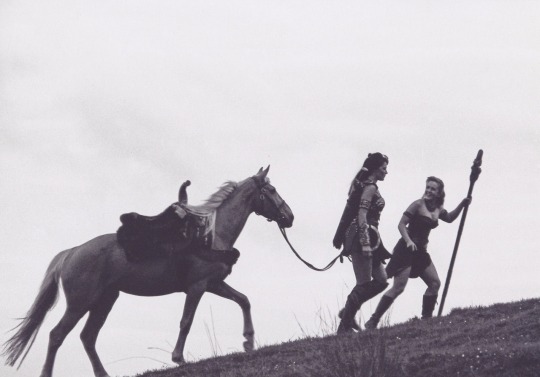
The one thing that surprised me about the show, was the lack of packaging. Even though it was a fantasy, it also played with different kinds of genres too. I’ve talked about this before in my other review - ‘Xena’ was made at a time when TV had very few rules/rarely had a set audience, since there were parts of the show that were clearly for kids and there were other parts that were clearly for adults (therefore had much more flexibility). I admired how they weren’t afraid to break barriers and touch on deep themes such as religion, morality, redemption, spirituality, motherhood, forgiveness etc - even more than shows of today are able. I also loved how they played into the idea of ‘murder’ and how much it can damage a person - not just the person who commits the act, but the many people affected afterwards. I wasn’t expecting it to be that extreme. It made me think that this must of been the inspiration for ‘Game of Thrones’.
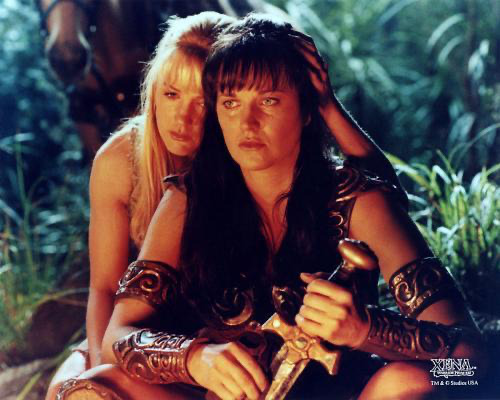
I see a lot of comments here and there, saying how ‘cheesy and terrible’ it was but to just accept it because its part of the fun. And while like any show it does suffer from the occasional spell of bad writing (the whole of season 5) but it was also shown to be very aware of that fact and never took itself too seriously - unlike some shows I could mention.
And regarding the ‘cheese’ factor (what 90s show wasn’t) It definitely can be, but I would call it ‘camp’ and ‘experimental’ more than anything else. (Don’t diss the poor use of CGI - I’m personally sympathetic to what was avaliable to them at the time) The style of humour reminded me of Taika Waititi’s filmmaking. If you’ve watched any of his films such as ‘Hunt for The Wilderpeople’ or ‘Jojo Rabbit’, then you know what I’m talking about. I liked how little they cared about being accurate or logical, which added to the ‘bonkers’ element in the show - which you can see in all of Taika Waititi’s films.
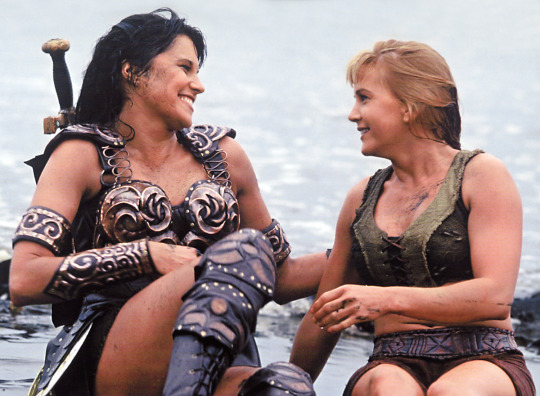
In all seriousness, a show centered around two women in their late twenties, who are realistic sizes (not trying to play teenagers). One of whom is a reformed mass murderer, who has lived a life experience, trying to do good in the world for the first time, picking the other one up who has no life experience prior (after they bugged them until they said ‘ok fine’) in their path to redemption. Just two women who become friends travelling the world together, fighting crime, having a laff, learning from one another without any toxicity - when suddenly when the stakes are raised - they realise ‘oh I'm actually falling in love with this person’ I have watched a lot of badly written shows in my childhood enough to know that, that’s not ‘cheesy’. I’ve never seen a story like that in my entire life. I’m not at all surprised that Russel T Davis was inspired by it while writing the Doctor and Rose’s relationship in ‘Doctor Who’ since he’s gay himself.
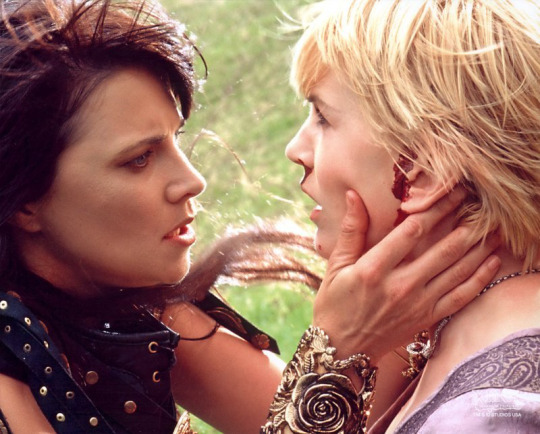
What’s more amazing about their love story is how they’re both develop as separate people as well. There was this video essay explaining ‘Why you should watch Angel’ the spin off series to Buffy; how ‘Buffy The Vampire Slayer ‘was all about growing up and ‘Angel’ was all about being an adult. With Xena: Warrior Princess, you have both of those stories at the same time.
Xena’s character was such a multifaceted experience to watch. And I can’t imagine anyone else who could play her as well as Lucy Lawless. What planet did they get that actress from? She's flawless! The amount of skill she has to put herself into a very physical role is astonishing. I personally had a love/hate relationship with her character all series long. Not in the way that I hated her, just that I couldn’t trust if she was all good or bad, which I know was intentional on the writers part. I haven’t seen a character quite like her before. She felt very much like a fallen angel; almost like the villain of her own story. Some of my favourite episodes come from fleshing out her character and dark past (‘Locked up and Tied Down’ is one of them) which reminds the audience that's she's not the stereotypical hero everyone expects. I loved her transformation from being this incredibly stoic warrior to being content and happy with who she is in season six, all because of a woman she fell in love with along the way.
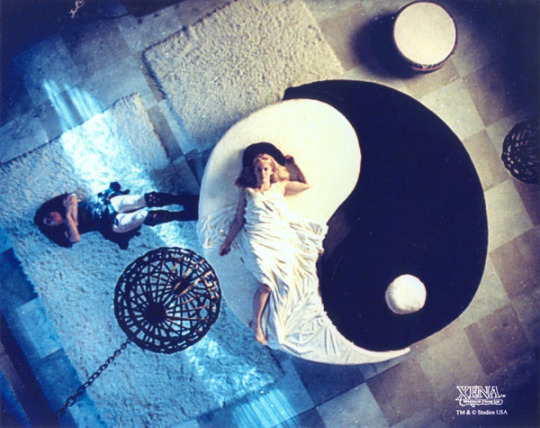
I’ve always thought of Gabrielle as the real hero and narrator of ‘Xena’. She’s the prime example of ‘a normal person becoming extrodinary’. Gabrielle’s coming of age story starting out as an innocent girl from a poor village dreaming of adventure, and ending as this vicious warrior who realises the ‘adventure’ wasn’t how she made it out to be is honestly the best character arc that I’ve ever seen. I loved how travelling with Xena made her realise her passion for writing (which was never going to happen in her home town, given the ‘sexist’ and ‘heteronormative’ ideas) and that she became a amazon princess like Xena. In regards to her sexuality, which is more up for debate than Xena’s (which I think we can all agree is bisexual) I personally interpret her as gay, just in terms of how she was written. Theres this moment in season 4 where she's being held up her hair, and Xena “symbolically” cuts it off ‘freeing her’. And she never really gets with a man afterwards, unless she’s being ‘possessed. It reminded me of a moment in one of Hayao Miyasaki’s films ‘Laputa, Castle in the Sky’ where the bad guy Moska shoots Sheeta’s ‘princess hair off’ which symbolises her transition from child to adult.
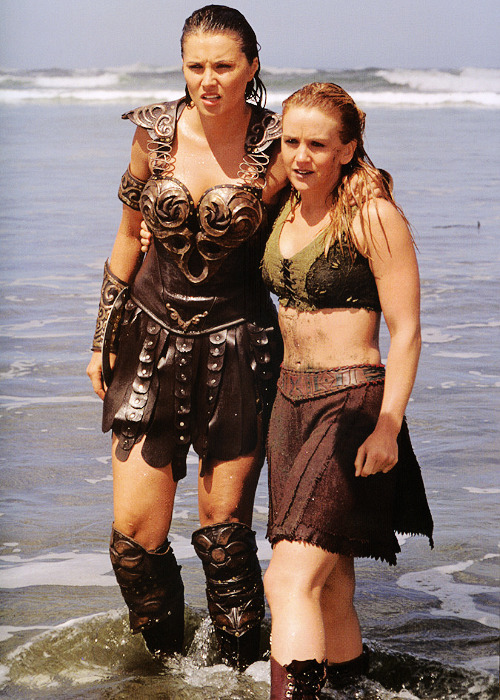
The cinematography was breathtaking. There was some great utilisation of New Zealand as the scenery. So was the soundtrack. You could tell it was made by experienced filmmakers. One of my favourite things about the show was the domestic elements - moments in the show where time seemed to stop - which made the world around the characters seem very real and magical. Even though it was a show that featured a lot of action/adventure, there was also this gentleness to it as well. For example, you could feel the wetness of the rain, the warmth of the sun and the clashing of the waves. This technique is used in Hayao Miayasaki’s work a lot .
The technique is referred to as ‘MA’ 空虚 meaning emptiness in Japanese. ‘Miyasaki describes this as the time between a clap’
“If you just have non stop action, with no breathing space at all, its just busyness. But if you take a moment, then the tension building in the film can grow into a wider dimension” - Hayao Miyasaki
undefined
youtube
The episode ‘A Day in the Life’ in season two is a really good example of this technique being used.
To my understanding, they used a lot of the local actors in New Zealand, which according to Lucy Lawless, consisted of ‘African immigrants and other different ethnicites’. It was so refreshing to see such a diverse show (despite some slip ups) especially in the 90s. I appreciated the idea that if the actors or extras couldn’t do an ‘american accent’ people could just talk in their natural speech which was also very refreshing.
The LGBT representation was surprisingly amazing. I never expected so many queer characters in one show - especially under the censors. There was this one episode where they had a trans woman - played by an actual trans actress - win a beauty contest. It made me cry. Not to mention the actress was an aids activist. It was actually Lucy Lawless’ idea to kiss her which was incredibly controversial at that time considering how everyone thought you could catch aids just by kissing. I can definitey see how it validated people back in the 90s.
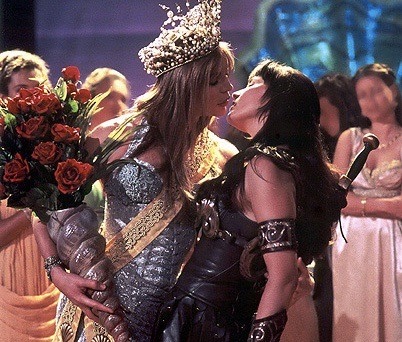
When people told me that Xena: Warrior Princess was one of the greatest love stories, I thought they were exaggerating a little. But no, watching the show in context, I found out that it really is. Despite its obvious restrictions, It made me realise (regarding token gay couples today) how often television writers rely on physicality and drama to convey a ‘love story’ and how much of it is actually pandering the audience. One of the reasons why Xena and Gabrielle’s relationship felt so genuine is because it was built on mutual respect/compassion and they were also best friends. I felt like I was witnessing something very real and private. It didn’t need kissing scenes or drama to make it interesting.
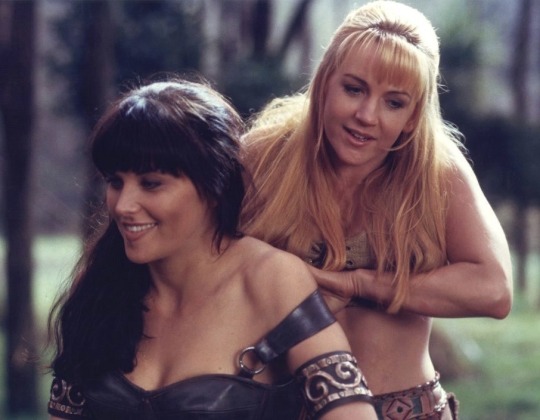
It really helped that most of the writers were queer also. There’s this opening scene in season 4, panning over to Gabrielle giving Xena a massage (metaphor for sex - because they weren’t able to show that on screen) which I consider to be one of the most iconic scenes in media - considering how I wanted to sick up my supper when I watched the 10 minute ‘empty’ explicit sex scene in ‘Blue in the Warmest Colour’. The difference when something is written by a queer women vs a straight man.
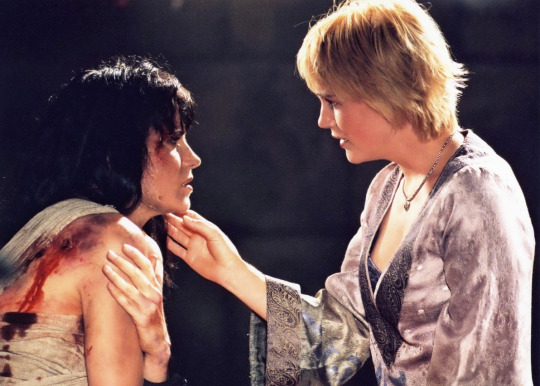
Because the creators weren’t allowed to write their love story in the normal way, due to the studio forbidding them to, they found creative ways to showcase that love on screen - which made for a very magical/sensual experience. And I can safely say, if anyone has doubts about watching ‘Xena’, whenever I expected to be queer baited at a few points in the show, I was proved wrong time and time again. It’s the most romantical show I’ve ever seen in my life!
#xena: warrior princess#xena#xena x gabrielle#review#rating#analysis#renee o'connor#Lucy lawless#90s show#lgbtqia#lgbt#pride month#-- it truly is a unique show#gabrielle#studio ghibli#hayao miyasaki#quote#film#reference#fantasy#lgbt representation#lgbtqia representation#doctor x rose#xena x gabby#subtext#happy pride 🌈#queer subtext#xwp#xena and gabrielle#xena & gabrielle
280 notes
·
View notes
Text
what the world will look like when it’s over
Can’t Get You Out of My Head is the first Adam Curtis documentary I’ve seen. I gather it’s not the most successful demonstration of his method; it sounds like Hypernormalization or The Century of the Self are tighter in their construction, less effortful (count how many times Curtis says something like “But then it started to run out of control” in this one), and perhaps less frustrating in their narration. In the early episodes of this documentary in particular, it feels like Curtis is constantly presenting what’s being covered as the turn, the decisive shift in his narrative—the emergence of the American counterculture, the revolution of the “unit of One” led by Mao Zedong’s wife Jiang Qing to help her break the stalemate with the other revolutionaries in China into which Zedong had fallen in the 1960s, George Boole’s development of Boolean logic to describe human thought. And the whole thing feels longer and baggier than it needs to be. The early episodes devote much time to interesting individual narratives, like that of the Trinidadian British activist or sorts named Michael Freitas (or Michael X) or a trans woman named Julie in 1960s Britain; they also sprawl in a way that makes the overall argument a bit hard to divine. It’s not until the fourth episode that the shape of Curtis’s narrative becomes clear—that our age is the product of a struggle between a new, broadly liberal-democratic and capitalist image of individualism, a dying era of collectivist struggle, and older, more vicious systems of power, derived from the control of capital and expressed through the middle classes’ suspicion and viciousness toward the subaltern and toward each other, even as they remain subject to the power of oligarchs and billionaires.
Curtis also seems to play fast and loose with the facts sometimes. When he presents Médecins Sans Frontières’s founder Bernard Kouchner as an avatar of a theory of the “one world” of liberal democracy—the idea that we’re basically one world of individuals, enjoying certain human rights regardless of political orientations or ideologies, and that Western nations are duty-bound by virtue of their prosperity to intervene when other nations violate people’s rights—it seems a distortion of what Kouchner actually says in the footage Curtis includes: “We don’t care on leftist or rightist countries [sic]; there is no leftist and rightist suffering, and there is no possibility to split the world in[to] ‘good’ people or ‘bad’ people, ‘good’ dead and ‘bad’ dead.” Which isn’t to say Kouchner didn’t believe in liberal-democratic ideas—he may well have—but what he’s shown as saying has to do with the consideration of suffering as suffering regardless of a person’s identity or allegiance, which is a different matter.
This is just one of several moments when I stopped to wonder how secure I actually was in Curtis’s hands. But ultimately, I find the emotional history he lays out resonant. The age we’re living through now, in the 2020s, is indeed the product of certain fantasies of individualism and of a post-end-of-history, neoliberal “one world”—with no ideologies but capitalism and putative democracy—meeting age-old systems of power, acquisition, and control, and age-old features of the human mind and heart: resentment, prejudice, betrayal, jealousy, the need to be prosperous, the need to be free.
And Curtis’s work appeals to me for the same reason the writer Pankaj Mishra’s work does. He historicizes our underhistoricized time. What’s more, he does so in a way that’s especially rare to see in any mainstream media venue. Usually, when you want to understand the connections between, say, colonial-era empires and post-war welfare states, or if you want to understand what happened to turn Western societies as they were post-war to Western societies as they are post-financialization, you have to seek the information out on your own. It’s valuable to have someone in a place like the BBC willing to put the pieces of these narratives together. And willing to remind us of the events that are so incredibly easy to forget even in one’s own lifetime. Abu Ghraib, for instance, which pops up in part 6 of the documentary. That shit happened while I was alive. How often do I remember it? How many American sins get drowned out in the new ones that emerge every day of every month of every year? Or in the stasis that sets in when what was once novel, like the War on Terror or the invasion into our privacy represented by the Patriot Act, fades into regular life?
I was jotting down copious notes while watching the doc, as is my wont. The questions and thoughts that came up, in no particular order:
How do the elites of a given era impose their preferred ideologies? How are the structures of power we grow up with constructed, and how do those go on to shape our behavior?
Control, as it’s practiced by societies in the 21st century, often comes down to the recognition of patterns in human behavior—and their manipulation.
The loss of power, like that which was suffered after the collapse of Britain’s empire or in the slow hollowing-out of America’s manufacturing industry in the 20th century, leads to anger and melancholy that people can’t be expected to abandon. Does doing what you’re supposed to do bring you the happiness you were promised—or anything even resembling that happiness? When we’re living in a historical moment in which the answer is no, as is often the case today, we’ll need to watch out. It’s a sign people are being manipulated and abused.
Over time, the tech industry has come to understand that you can manage people en masse by collecting their data and manipulating the messages they receive in social media activity feeds and advertising—and you can make them feel like sovereign individuals at the same time through the very same means. In light of all this, will there ever be a revolution that actually changes the structure of power we’re currently stuck in? Is there a chance to alter this extreme individualism. on the part of people who are surrounded by political systems so enervated, by the supra-governmental system that is global finance capital—which politicians can’t control, and must appease and palliate—that they can’t respond to phenomena like climate change or meaningfully punish atrocities like wars prosecuted on false pretenses? Or are we stuck where we are, in a world that’s corrupt and exhausted? In nations whose governments depend on technologies of surveillance and myths of consumerist abundance or nationalist glory to maintain power, in the absence of any real vision for the future?
It all leads to some interesting takeaways. For one, the way culture reacts to politics and vice versa. As I was watching Can’t Get You Out of My Head, I was reminded of a conversation folks on the Discord server for the Relentless Picnic podcast had had recently about the strange things Richard Dawkins posts on his Twitter account. And it led me to think: when religious “caring conservatism” was in the White House, Richard Dawkins and his New Atheism, this brash repudiation of religion and its pieties, grew as a counterweight. When Obama and his technocratic regime were in power, with social media bringing on a wave of progressivism in popular culture and algorithms presenting us a fantasy of endless choice—much of which was a thin veneer over the same old shit: banks getting bailed out, forever wars going on, productivity rising while wages stagnated—we also got Jordan Peterson-types who claimed to speak to a human need for narrative, even in this point of stability we had seemed to reach, this recovery of sanity after the chaos that was the Iraq War and the financial crisis; who claimed we needed ideas and myths to animate and drive our lives, because they sensed there was something hollow and mendacious driving all this consumer choice, for all it seemed a symbol of our freedom and progress.
Of course, both Peterson and Dawkins are provocateurs, not intellectuals; I don’t mean to dignify the movements they led much, since in both the appearance of intellectual rigor or moral clarity often covered the indulgence of the worst instincts: immaturity, obstinacy, provocation for provocation’s sake, contempt for women and trans people. The New Atheists had a point, and could be absolute assholes about it; they ultimately could be as fundamentalist and dogmatic as any religious people. As for Jordan Peterson, his actual work, in the way of so many grand theorists, uses the appearance of profundity to cover something ultimately pretty banal. And he’s most known for grandstanding in the public sphere—refusing to use people’s pronouns, the usual conservative shit. But these movements do seem to reflect a countercultural response no less than 1960s counterculture reflects a reaction to the staid culture of 1950s America and the sins it covered up.
Which leads me to the question: what was the culture’s response to Trump’s administration? Maybe QAnon and Russiagate, as conspiracies—that is, actual narratives people inhabit to explain the world’s evils, and not just a vague need for them that they satisfied with Jordan Peterson’s light form of Stoicism or his theories of Light and Dark or whatever the fuck. And in that way, perhaps, once a countercultural movement—namely nationalism and Trumpian populism—actually seemed to have overthrown a regime, of Obama-era liberal technocratic management, culture and politics came to mirror each other, rather than standing in opposition to each other. Both became equally conspiratorial and unhinged; in fact, they merged. All the ruling myths and conspiracies mutate in kind these days: Trump’s garbage about draining the swamp, a cover for Trump and his family enriching themselves and Stephen Miller’s like getting to fashion the state they wanted, becomes QAnon’s garbage about rings of child trafficking and pedophilia and Trump, of all people, being their savior—all while actual trafficking and abuse perpetuated by Jeffrey Epstein and his ilk goes unpunished, Epstein’s death swallowed up by the state without a sound—becomes the liberal pundit class’s screaming about Russia: connections between Trump and Putin that were always conjectural to me, because no one who pled them seemed to feel much need to substantiate them.
Here again I feel like what were once centrifugal forces in our culture—between mainstream and the independent media, for example; between people in power and their critics, either in the media or at society’s margins—have collapsed into a single morass. We’re all in hell and there’s no way out.
In all this, what does Biden’s administration represent? Little more than an interregnum, to my mind. How disappointing to see not even a gesture toward forgiving student debt or raising the minimum wage in these first 100 days of his presidency. There’s been some progress in climate legislation, and progress in putting Stephen Miller’s deportation machine to a halt (though they’re also reopening several emergency shelters to accommodate more minors already being held past the mandated limits for keeping them in the custody of the Department of Health and Human Services’s Office of Refugee Resettlement). But there’s also been such triangulation on policy by the administration and its supporters and such complacency on the part of the media covering the administration, refusing to call them out on or even cover this. And how can the average voter respond but with resignation?
Ever since I read Thomas Mann’s Doctor Faustus near the start of lockdown, absorbing the picture of the world pre-World War II that’s presented in that book, I’ve thought we’re in the same sort of moment that Mann’s protagonist Zeitblom was in. There’s a crisis that’s passing over this whole planet like a wave or a seismic event, and no human intervention can interrupt it. We can only wait for it to pass—holding on to whatever’s to hand, waiting to see what the world will look like when it’s over.
#adam curtis#documentaries#thomas mann#jordan peterson#richard dawkins#pankaj mishra#the relentless picnic#conspiracy
28 notes
·
View notes
Text
It’s all religion, and it’s all profane

Over the past few days I have delved, rather pointlessly, into the messy scenery of the UK’s ongoing gender wars. My interest was equal parts morbid and academic. I hoped to answer two questions. First, why is the back-and-forth between trans rights advocates and gender critical feminists so vicious in the UK, culminating not just in the threats and recriminations found in the war’s American iteration, but in women being blackmailed and even arrested.
The second question is why is it even happening? That is, why is the UK in particular a hotbed for an ideological war of this type among liberal-identifying people, while in the US the feminist movement has accepted trans ideology more or less uniformly and with minimal pushback. My first inclination was that it was a matter of professional survival. Perhaps academic jobs aren’t as precarious in the UK, meaning that it’s somewhat safer for people to issue heterodox opinions. But, again, the viciousness of the first question seems to rebut my assumption in regards to the second. Losing your job is bad, but going to prison is worse.
Of course, I found no clear answer to either question. UK academe is utterly unknowable to an American who’s never experienced it. I found out what “O Levels” means but after that I got kind of lost. As much as a shitty lie our myth of academic meritocracy might be, the UK makes us look like a Dutch Montessori school run by doctrinaire Quakers. If your first name isn’t proceeded by Lord, Lady, or Sir, or if you don’t have a number after your name that’s at least as high as The Fourth, there’s not much of a chance you’re going to get yourself a gig within Oxbridge.
So I delved into the viciousness, and oh boy did I get what I was looking for. The English are renowned for their dry, cutting humor, but that’s because only the best of the best come into the American purview. The majority of pedestrian UK humor is a sort of sarcasm without jokes. Like, let’s say you brought home a sausage pizza. I asked you what the topping was and you said “It’s pepperoni, mate.” And then you opened it up and it was sausage and that made me confused and slightly pissed. That’s the extent of the comedic ability of your average Brit.
The fights, meanwhile, are more direct and blunt, really a sight to behold. Again, there’s no attempts at humor, which tend to accompany the verbal conflicts of Americans. When Americans fight, we’re usually doing it to try and get the people around us to think we’re cool. When UK people fight, they just want to hurt the other person.
Of course, there’s much in common between the US and UK iterations of gender discourse. Minor disagreements are regarded as violence, hyperbolic overstatements of harm are routine, and person who uses terminology that was considered progressive up until very recently can find themself labeled a Nazi for not making linguistic adjustments quickly enough. But it’s still somehow even more rancorous in the UK. You get a sense that they’re not in it just for online clout but out of a desire to cause real, physical harm to members of the other side.
One of the more salient aspects of UK arguments is how their insults will often consist of a simple description of a person. Sometimes you’ll get “fat” or “snaggle toothed” or something most of us would consider mean. But other times it’s like “you blonde cunt” or “you working class shite” or something else that us Americans would never regard as an insult. Mentions of religion are surprisingly common. They say “you Catholic bigot” as opposed to “you bigot,” or “you deranged Protestant” instead of “you freak.”
This really struck me. You’d never, ever see that in America. Firstly because it’s taboo (unless it’s a Republican talking about Muslims). Secondly, because we simply do not care. Your average religious American cannot articulate any meaningful difference between Catholics and Protestants. We have no need to, because as much as we love Jesus we don’t bother with any of the messy parts of religion, such as having a faint understanding of the faiths we claim to adhere to.
This, I have always felt, is the greatest folly of New Atheism. What are you gonna do, present a scientific case demonstrating the absurdity of the creation myth? You gonna stick solely to the bible and highlight its multiple hypocrisies and contradictions? What is that gonna achieve? These people had Donald Trump autograph their bibles. They think salvation can be purchased by giving 20% of their paychecks to millionaires who preach in stadiums. There’s nothing an outsider can do to profane their religion that’s more obscene than the manner in which they practice it.
(I recall a time in my mid-teens when I attempted to “A-ha!” a youth pastor with my knowledge of the story of Jephthah from the Book of Judges, who committed yahweh-approved ritualistic sacrifice of his eldest daughter. In response, the pastor informed me that he hadn’t read that part of the bible, and that his relationship with Jesus was more about the feelings it gave him than some words written down in an old book. Needless to say, he won the argument.)
The UK is, even now, broadly to the left of the US in regards to their social safety net and most cultural matters (this is a low bar, for sure, but they do clear it). Perhaps people who us Americans would identify as liberal (in that they don’t openly want to murder poor people; they’ll often still do it, but they won’t giggle while doing it) aren’t as ideologically siloed over there. The Democratic party is, after all, an unworkable mishmash of a few dozen different concerns, and their basic strategy since the Clinton era has been to blame the incompatibility of those concerns for the fact that their governance is indistinguishable from that of the GOP.
An American liberal therefore doesn’t focus on piddling things like principles or ideals or even whether or not a policy they support does the exact opposite of what it’s supposed to achieve. Paying too close attention to the workings of our coalition will reveal its manifest contradictions, which will in turn weaken it, and if gets too weak then we’ll once again have an evil fascist doing the exact same stuff that a good and honorable man like Joe Biden is presently doing. Instead, we must understand politics as a means of achieving self-actualization through the process of deferring our concerns to others. Those concerns are not addressed within the present system, no, and neither are our own, but worrying about cause and effect and results is not the point. It’s much more important to exist, to validate, and to listen.
In the UK, politics is still understood as politics. It is a means of gaining and exercising power. In the US, politics falls eerily in line with our profane understanding of what religious devotion entails: an acontextual, borderline illiterate expression of ourselves, which we have been trained to believe connects us to some kind of higher power that unifies us as humans by calcifying our utter disconnectedness from one another.
And so maybe that’s the difference? In the UK, people are delusional enough to think that politics is entered into by people who have something to gain or lose. In the US, it’s all about vibes.
10 notes
·
View notes
Note
hi! not whoever "parasoles" is, just a confused anon! i dont mean to be rude or anything but like... isnt it harmful to Jewish people to headcannon an abuser as Jewish? you make very valid points what with his name and the opression but it's just. he's... a bad person. why would you do that to your own religion? unless you have a completely different version of Adam for yourselves (because lol fuck canon), wouldn't it be harmful? not attacking you, just geniunely wanting to learn!
i think that it’s important to realize that anyone, from any colour, denomination, sexuality, gender, etc can be an abuser. if this was canon & he was the only jewish aligned character in the show, then yes we would absolutely have an issue with that because there’s no opposite to balance it out. jewish people are absolutely capable of being bad people, we’re not magical creatures lmao, we’re just as human as everyone else.
i also don’t agree with a lot of the writing decisions around adam & think they’re harmful in terms of abuse survivors & former slaves (which adam was, he was enslaved by the sdc & branded like cattle.) making him into a vicious stereotype of a yandere ex boyfriend was piss poor writing because it turned his very privileged student into the peak of faunus oppression (which she isnt) while adam became nothing more than a man obsessed with her & gave little to no care for his own backstory, dealings with other faunus, time in the white fang, etc. blake’s actions are contradictory to how an abuse victim acts, from one herself. you don’t doodle pictures of your abuser. you don’t let them go free for some form of revenge or vindication where they could go on to to do further harm like they have promised you they will. a lot of adam’s later actions are contradictory to previous scenes shown, not only in the trailer, but in v3 where he was perfectly happy to let blake go free because they had a bigger mission at hand.
adam is not a perfect person or even an idealized character ; he’s a character that crwby wanted to be two different people. the mentor who lost his way & the abusive ex boyfriend for more blake angst ; but when you make your most oppressed faunus in the show a remorseless, irredeemable monster, it’s not only bad writing but it’s harmful.
we have a different version of adam in our azre au where he is still very much traumatized & fucks up, very badly ; but these issues are dealt in a more nuanced way than crwby ever did. crwby never thinks through the messages they portray in their works because they either aren’t empathetic enough to treat these issues with care or they just don’t care enough to.
magneto is jewish. magneto is a holocaust survivor & someone who saw his family burn alive. he’s also someone who has fucked up incredibly but had these ideals to want the best for his people, so they would never suffer oppression or extermination like the jewish peoples have. he was allowed to be written in shades of grey, to allowed to be more than his children’s abuser or the ego maniacal mutant supremacist, his trauma was not ignored & he wasn’t butchered for another characters development.
adam wasn’t allowed that.
at the end of the day, our headcanon is our headcanon. we have reasonings behind it that honestly have more canon grounding than a lot of headcanons in the fandom or popular theories, especially offensive ones like making blake “more poc” bc she’s not oppressed enough or dark enough for some people & they can’t handle her basically being white in literally everything about her character but her weapon ; but it’s still a headcanon. people don’t have to accept it, just as luke doesn’t accept a lot of trans headcanons bc he finds them fetishistic or i don’t accept a lot of lesbian headcanons bc i find a lot of reasonings behind them biphobic. we’re not shoving this down peoples throats, but it is our way of combating some of the racist, horribly insensitive takes like white saviour adam or adam stole blake’s place in her story.
#rwby#rwde#adam taurus#owl.txt#answered#a long ass post to basically say#in some situations yes this would be harmful#especially in canon#but as a headcanon?#its not bc we recognize that this#is OUR headcanon#not anyone elses#just like we dont accept poc blake#ppl dont have to accept our headcanon#hope this makes sense!
22 notes
·
View notes
Text
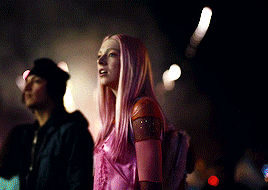
☆「hunter schafer & trans woman」⇾ adams, melina, the sophomore student’s records show that she is an aries and 20 years old. she is studying fashion design, living in gorham and can be outspoken, funny, secretive & vicious. when i see her i am reminded of pockets full of stolen jewelry, a paper cut from an old dollar bill, the devil wearing prada. ⇽「madison, 23, cst, she/her」
pin board ☆ playlist ☆ connection ideas
smiles lovingly here is my daughter.... lv my children so much.... <3
BASICS
full name – melina sabrina adams
nickname(s) – mel
age – 20 (b. april 9, 1999) (ARIES)
gender – trans woman (she/her)
religion – atheist
alignment – chaotic evil???
mbti – estp
occupation – fashion design sophomore & scammah
PHYSICAL TRAITS
faceclaim – hunter schafer
eye color – blue
hair color – pink
height – 5'10
piercings & tattoos – nose ring, multiple earrings, got annoyed w the tongue stud n took it out, no tats yet
BRIEF DESCRIPTION
Problematique,,,,,,
certified scumbag who truly does not give a fuck about god or anyone…. bi, kinda spoiled, MEAN AS HELL
(cw: drugs & death mention) parents were southern ass meth doers n died when she was rlly young like when she was 3 and her aunt (mom’s kinda estranged sis who was rich as hell) took her in and uhh basically saved her life being a lot more progressive of a person than mel’s parents ever were. mel came out to her at age 10 and they were v close
bc her aunt was well off she kinda became spoiled but was still generally a nice kid… but her aunt started dating this woman who was like The Literal Devil and mel started acting out
throughout all of high school, she landed three stints in juvie and got fired from sixteen different jobs (the same starbucks twice). she’d always had rather intense authority issues but they really bloomed LMAO
mel HATES school but her aunt basically threatened her n said she had to go to college or else she’d be cut off forever. mel knows this was her stupid gf’s idea but she’s going anyway because that’s basically her only family (and source of income).
she does enjoy the environment though… plenty of ppl to piss off, plenty more to fuck with, and just enough left over to just flat-out fuck. loves a good party.
she steals A Lot it’s genuinely a problem. honestly she’s not like a psycho or anything but deep down feels like maybe she is and does a bunch of dangerous and stupid stuff for shits n gigs
genuinely likes fashion and going to school for it she just …. ugh. Hates People And Also Being Graded On Everything And Showing Up On Time
she’s VERY closed off like ik i just wrote her whole life story or whatever but she like does not talk about her life she’s just kind of there with her opinions and bitchy comments, pls love n accept ha into ur arms
7 notes
·
View notes
Photo
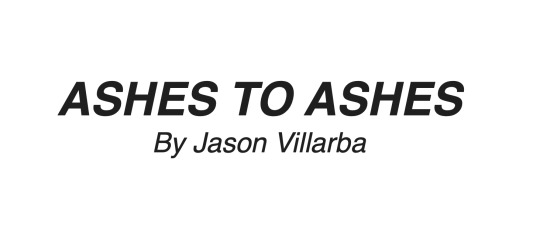
Some may think of domestic violence in the United States as a uniquely “female” experience. What is problematic about this thought process is that it misrepresents the issue and invalidates the stories of millions of male, trans, and non-binary victims. I would know, because I’ve gone through it.
The reality is anyone can be the victim of abuse in a relationship.
To be struck by the hand of their loved one is a universal trauma, a painful epidemic that affects individuals in every community, regardless of age, wealth, gender, sexual orientation, religion, or background. And while I can sit here and tell you that it’s an overarching matter and that it needs to be looked at from all angles, the fact of the matter is, there’s a reason why so many people share this preconceived notion.
Reality is disproportionately cruel when it comes to America’s population of women.
Domestic violence may be a crime that is indiscriminate in nature, yet, its concerning statistics and research suggest a story that is quite the opposite.
“Women ages 18 to 24 and 25 to 34 generally experience the highest rates of intimate partner violence,” and “from 1994 to 2010, approximately 4 in 5 victims were female”
And while “almost half of all women and men in the U.S. have experienced psychological aggression by an intimate partner” in their lifetime (48.4% and 48.8%, respectively), women are nearly 3 times more likely than men to have “experienced rape, physical violence, and/or stalking by a partner” and report it as “having a related impact on their functioning” (~3/10 vs. 1/10)
Over 1 in 3 women (35.6%) in the U.S. have “experienced rape, physical violence, and/or stalking by an intimate partner” in their lifetime, and just under 15% (14.8%) have sustained injuries as a direct result
1 in 4 women have also been the victim of what can be considered “severe physical violence by an intimate partner” in their lifetime
Research also suggests that “the majority of women’s physical violence against men is in response to being abused by those men”
To make matters more bleak perhaps, it’s apparent that the United States and its authoritative bodies typically do little to help these women. The National Domestic Violence Hotline and Professor TK Logan from the University of Kentucky conducted a survey of women who contacted the hotline, finding a strongly shared reluctance in trusting law enforcement, regardless of prior interactions with the police.
1 in 4 reported that they would not call the police in the future
More than half reported that calling made conditions worse
2/3 or more expressed a fear that turning to police would prove to be a futile effort: scared they would refuse to believe them, or do nothing to intervene.
Members of law enforcement have commonly been found abusive, with sexual abuse ranking second in all forms of police misconduct.
More than just a single strike or disagreement turned ugly, domestic violence is a pattern of behaviors used by a partner to maintain power and control over the other in a relationship. These patterns also tend to extend onto children, leave long lasting effects in teens and young adults, pervade workplace environments, and are exacerbated by the presence of firearms. Physical violence is just one form of abuse, in fact, abuse is often present in multiple forms at once. Examples include:
Verbal abuse
Discouraging socialization
Exercising control over one’s finances and/or personal belongings
Extreme overprotection
Overreactions to a partner’s substance use
Actively preventing a partner from seeking help
Threatening a partner
Sexual abuse
Psychological manipulation
Gaslighting
Blackmailing
Self-victimization
CASES OF ABUSE CAN RANGE FROM A SLOW-BURNING CANDLE TO A RAGING INFERNO, BUT NO MATTER THE CIRCUMSTANCE, THE VICTIM IS ALMOST ALWAYS LEFT IN ASHES.
Ultimately, the longer one stays in an abusive relationship, the greater the physical and emotional toll. It becomes this vicious cycle that only becomes harder and harder to break, and at some point or another, you either break it or it breaks you. Speaking from experience, it’s easier said than done.
The first step in overcoming abuse is arguably the hardest: the internal struggle. Often, the victim is aware of their treatment. The question: “Why don’t you just leave them?” ends up becoming one of the most puzzling and most frequent questions you’ll encounter. You might respond with:
“You don’t know what it’s like…”
“But, we’ve been through so much together…”
“We’re doing so well now…”
“He/she can get better, I believe in him/her, I trust him/her…”
Or perhaps the hardest one of all: “But, I love him/her…”
And it’s okay to have these feelings. It’s often out of our control who we love, despite their flaws. What’s not okay, however, is loving someone with your best intentions and receiving this kind of pain in return. Letting go can feel like losing the battle, but considering your own safety and understanding that this isn’t love is the key to winning the war.
Consider these options:
Create a safety plan.
Call a woman’s shelter or domestic violence hotline at a safe time.
Pack emergency items and keep your important belongings on hand for use at a moment’s notice. Leave your emergency items in a safe place.
Know exactly where you’ll go and how you’ll get there.
Protect your communication and location. Be wary of trackable technology.
In an immediate emergency, call 911 or local law enforcement. Otherwise, try to seek help from the following resources:
Someone you trust - You can turn to a friend, loved one, neighbor, coworker, religious/spiritual advisor
The National Domestic Violence Hotline - Call (800)799-7233 or visit their website thehotline.org
Your healthcare provider - Medical personnel can treat injuries and refer you to safe housing and/or other local resources.
A local women’s shelter or crisis center - These typically provide 24-hour emergency shelter and support services, as well as offer advice on legal matters.
A counseling or mental health center - Support groups for women in abusive relationships can be found in most communities.
A local court - Seeking a restraining order can force an abuser to stay away or face arrest.
1 note
·
View note
Text
WIP tag
@banashee tagged me to post another work in progress, so I will post, un-edited, whatever bullshit I came up with last night when I was already half asleep after watching an ep of Suits and then reading an old Hanni&Nanni (St. Clare's) book. I think what my brain came up with is a crossover between those and also my ever growing fanfic multiverse so there's timetravel and dimensions and shit... oh, and naturally it's gay.
Wip lverse
Central arrives at Lindenhof
R/T (teaches) just been outed or sth, girls behind them but school threatened with being closed- dance, with boys from other school, H idea: dance ww mm, boys? Jenny's brother -> have an in, & if not all boys join doesn't matter as long as no Lindenhof girls dance with them. T/R gerührt but also hope won't nach draussen dringen)
Light off
Ugh wheretf are we, middle ages? Fuckinf castle and it isn't even hogwarts. Light...
Edits lumos maxima to fit kronleuchter
War nich lang dunkel also gleich wieder ans helle gewöhbt
Year? Oh lemme guess... Uniforms, awkward dance, electronic light but no smart tech in sight,... Must be xx... Hate that. Already bad capitalism of after & still shitty institurionalised homophobia & racism & misogyny of before.
Eyeroll
Well source isn't here, all muggles
???
Explanation:
Muggle= nonmagical
^or>: sacrilege!
Why?? Why does religion fit better or worse to nonmagical world? If anything magic is sth u can't explain fitting to religion, and as I have magic and you don't, if God exists likes me better than u
Pls no existential discussions before 3am after I had 3 vodka
Gross
Anyways
Looking for source: different universes, if timetravel splits, no-good bc vicious cycle, looking for source
Not here
U sure?
Knocks on Wall
Opens
Body in wall
O.o
Dude dead
Windstoss, zeefällt fast
Shield
Ugh now can't check for..
Well otherwise body!
...
Call the cops- poliicee! Just tell them sb hit a spec spot of the wall & it opened to a body. S the truth. & don't worry bout everyone being shocked, s a body in the wall, u gotta be shocked.
Girls notice T R stressed & not as close as want - H N Hilda J B C go 'need to talk to both' -> form wall so they can hold hands. Before leave turn around, T quickly presses kiss to Rs hand
Central thanks for assistance, & as thanks help against homophobia: a little confoundus maybe? Yeah, everyone in Castle who is homophobic & wants to act on it in some way is gonna forget homophobia exists. Forever? Hm naaah just until goes to sleep, but if next day same, same. Maybe enough to realise world doesn't end...
Isnt confoundus illegal?
Not if administered in a way xxxx by xxxx intentions and duration blah
???
Yeah lawyertalk u wouldn't understand
Oh shut up Harvard
Harvard? Yeah-
Already exists?
Founded in xxxx! Bitch. Bet already prestigious
...
Marianne near freak-out
Never allowed herself to think about it
Not since kissed Carla that day
Knows Carla just thinks about it and doesn't act on it, but she needed pretend wasn't a thing
Punches stuff in sportraum
H:??
Explains
So?? Not a problem for T R
Well they're not students!
?? Difference
Changing rooms! Schlafsaal!
So? I mean if makes u feel better guess can just turn around? But like eh. Hey actually... Ur into girls... So u know what looks good...
???
Would u be willing to check me out & tell me..... Bc want to impress some guy... U get to look without having to feel bad & I get info!
Not sure same (wlw mlw attraction)
Eh whatever best I've got. So?
Shrug sure whatever
In underwear when rest comes
???
Look
M shrugs like go for it
H explains happily
Rest also wants opinion
Petra eg afraid doesnt look good because Figur- M says pretty face way more important. Hilda says plus character more important anyway! M kinda almost laughs which makes Hanni laugh out loud.
Mamsell? Or sb comes around corner, Hanni (still in underwear) tries to hide, falls over tangled in skirt.
Who didn't ask M? Carla... What's with her anyway?
///before mamsell//Who's the prettiest?
Flickers to C. C blushes
Aww
Another pair of birdies?
Shut up!
Not since...
Omg so there is a since!
M heftig Yes but never again bc knew couldbt be!
Well now could...
C still won't tell mom- not cause she wouldn't approve but she'd worry about me and can't put her under strain bc health
M course
Just kiss already!
Oy!
Well?
Laugh and then they do bc wtf might as well happen this day already is so goddamn weird
Meanwhile J/B like when are they finally gonna figure it out lol
& Elli slowly realising that maybe those obsessions with Sadie and MrsQ etc were actually crushes xD
Hanni- heteroflexible
Nanni- ace
Jenny- bi/pan
Bobby- genderfluid, pan
Marianne- butch lesbian
Carla- femme lesbian
Elli- bicurious/bi
Doris- nonbinary/transmasc and still figuring out his sexuality
Hilda- lesbian
Carlotta- bi
Petra- straight
Jürgen straight
Peter x Wolfgang
Claudine trans girl
Sadie??
Yeah ok imma not explain but I might post a proper (ish) version on ao3 or my draft blog @thelucyverse some time :)
Tagging whoever sees this and wants to share!
#lilo writes#tagged#tagging meme#draft#wip#wip tag#lilo writes fanfic#hanni&nanni#st claires#suits#crossover#apr'20#17.04.20#banashee#answered#personal#x#personal 2020#my post#mine
3 notes
·
View notes
Photo
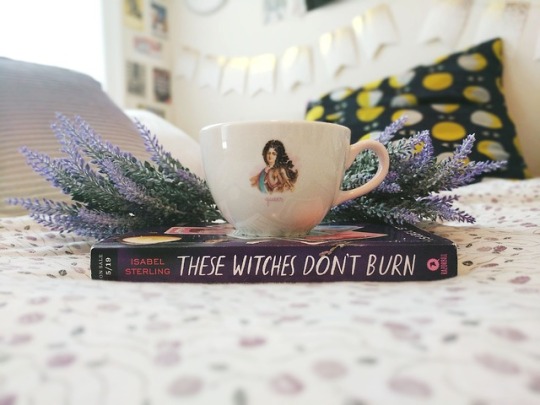
“The air is thick with malice. The fire burning behind us is vicious and hungry. Even the earth—usually a calm and steady element—feels shaken.”
Book: These Witches Don’t Burn - Isabel Sterling
Genre: YA Novel // Fantasy // LGBT
Rating: ✩✩✩ and a half
Hannah is a witch. She and her coven are Elementals, using magic to control air, fire, water, and earth. But even in her hometown of Salem, Massachusetts, she has to keep her magic a secret. If she ever used it in front of a non-witch, it could be taken from her with a binding spell. In lieu of public displays of magic, Hannah spends most of her time working at a local Wiccan shop and avoiding her ex-girlfriend, Veronica. But when signs of dark magic start appearing all over town, hinting at the arrival of a dangerous Blood Witch, relationship drama becomes the least of Hannah’s worries.
I’m going to be honest: I thought this book was going to be incredibly cheesy. It just has that vibe, and I really think it’s because of the title and cover treatment. But you know what? I also said that about Undead Girl Gang last year (although I loved the original cover on that one) and it wound up being one of my favourite 2018 releases. And while I do have some concerns about These Witches Don’t Burn, I think this one is probably going to be one of my 2019 faves.
The story starts out pretty strong. We’re introduced to our narrator, Hannah, who is training to be a fully-fledged Elemental like her parents. She works in a witchy pagan shop (which would totally have been my dream job as a teen), has a super intimidating cool high priestess for a grandmother, and is trying to get over a bad breakup. Magic aside, I thought she was super relatable, although I found her relationship with Morgan to be a little forced.
Within the first two chapters, we’re thrown into a dramatic hunt for a dangerous Blood Witch. But things aren’t quite what they seem, and the witch hunt (haha) turns into a desperate search for an arsonist who is targeting Salem’s witches. There are a few twists and turns, some death and some grief. I was a little disappointed that I guessed the arsonist’s identity early on, but I still enjoyed the big reveal in the final chapters.
I also really liked the magic system. Hannah and her coven represent just one of three types of witch: Elemental, Caster, and Blood. There’s a lot of tension between the different groups, and a particular prejudice against Blood Witches. All of this has been passed down for generations, stemming from the witches’ creation myth. I thought it was fascinating and I hope that Sterling delves deeper into their mythology and religion in the planned sequel.
While I loved the premise, the writing, and the queer representation (lesbian love triangle and a trans side character), there was one glaring problem with this book: it was so white. So, so, so white. In fact, the only person of colour that I can recall is a girl that Veronica is secretly dating. At least, I think they were the same person; she was pretty unimportant in the grand scheme of things.
I also thought I remembered Benton being coded as brown at some point, but then I couldn’t find it again. If he was black or brown, that would be massively problematic and a giant oversight on the part of any editor. No spoilers, but it wouldn’t be a good look. I’m just hoping that there is more (positive) POC representation in the sequel, because white people shouldn’t be the only ones who get to do magic. Also, it’s 2019 and having zero people of colour in a contemporary novel is unrealistic. I’m also hoping that the sequel has some adult characters who are actually competent and not totally oblivious to danger.
Overall, I don’t think that Sterling did anything new with this book. It’s more like she brought together some popular threads and wove them into a single enjoyable story. While I don’t think it’s anything ground-breaking, I did really enjoy it. It has a lot of drama and magic, a little bit of mystery, and a lot of potential. Read These Witches Don’t Burn if you like Sabrina the Teenage Witch, Riverdale, or Misa Sugiura’s It’s Not Like It’s a Secret.
Relevant tags for These Witches Don’t Burn:
YA // fantasy // LGBT // magical realism // death // grief // romance // lgbt author // magic // witches
#reviews#book reviews#books#booklr#bookstagram#bookish#bookworm#book nerd#book lover#book blog#book blogger#read#reading#read more#bookshelf#book photography#bibliophile#reader#instareads#instabooks#instabook#vscoreads#vscobooks#ya lit#read ya#ya novels#ya#fantasy#lgbt#death
87 notes
·
View notes